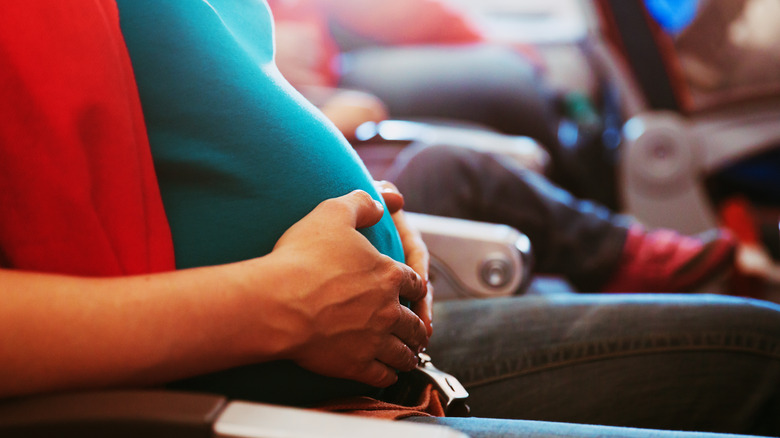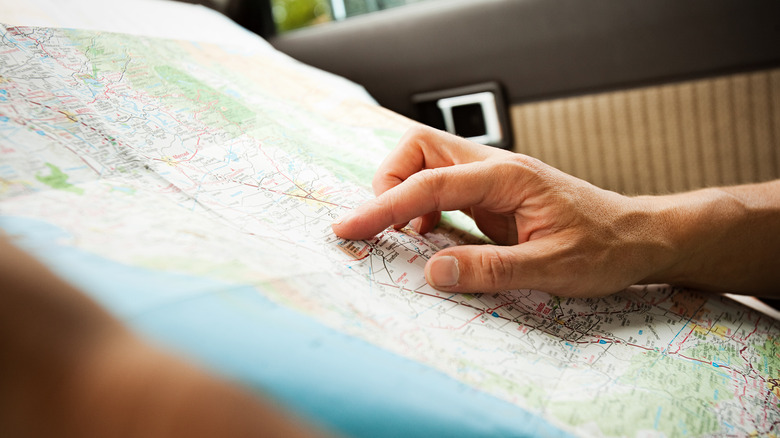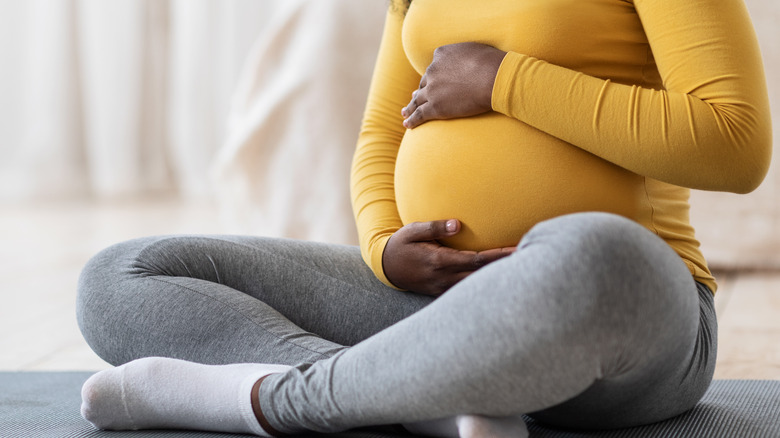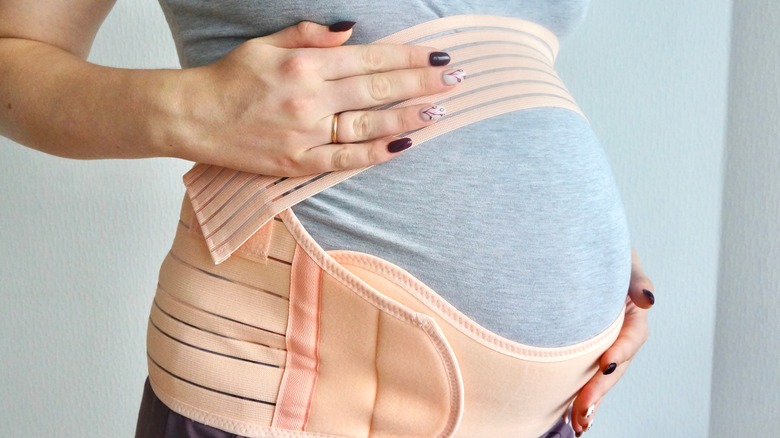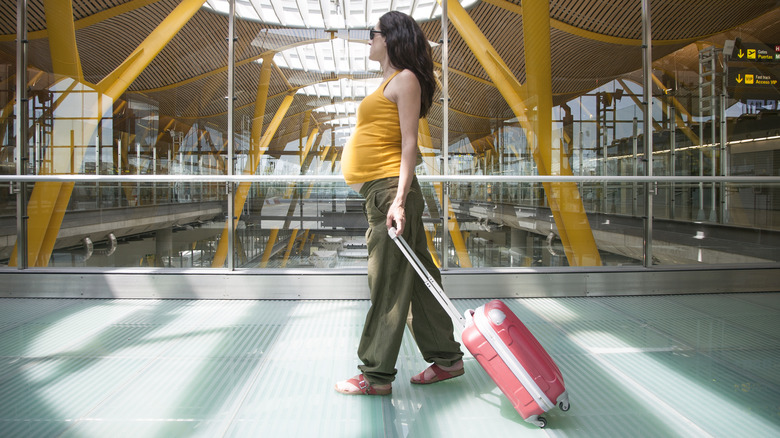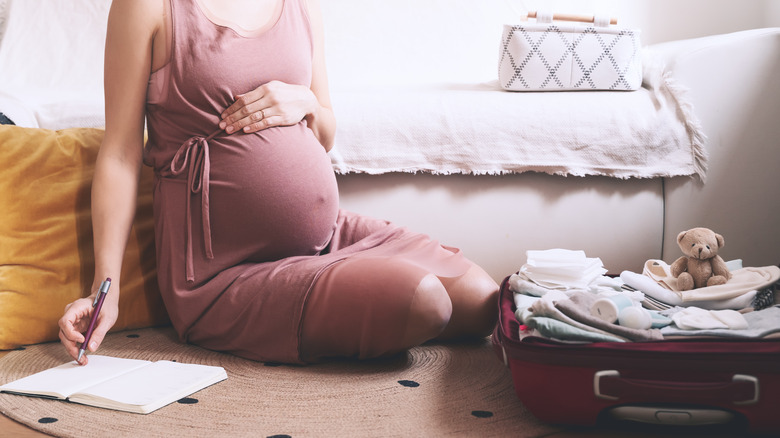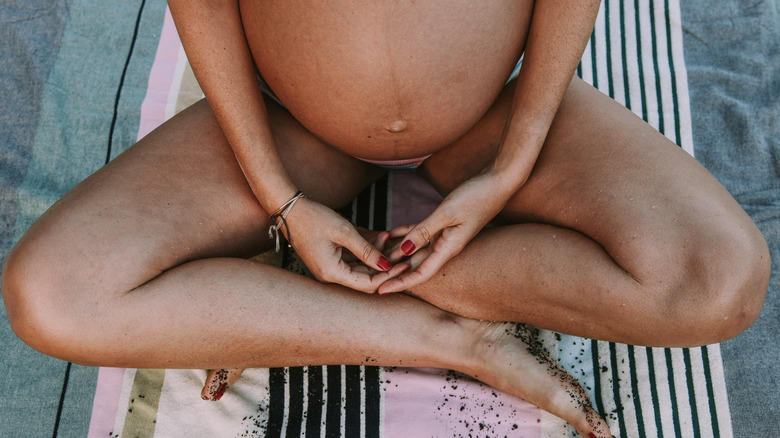Essentials To Make Traveling While Pregnant Even Easier
Becoming pregnant doesn't mean you have to fully change your lifestyle. Indeed, growing a new human being that you're excited to add to your family should be something to celebrate all throughout your pregnancy. If you love to travel, taking a trip before Baby gets here is a great way to be in the moment with your growing child and spend time reflecting on both where you are and where you will be when the child is outside of the womb.
Traveling during pregnancy is not only possible, but can also be a memorable way to welcome your new baby. If you do plan to travel while pregnant, though, you must take your safety and comfort into consideration when planning your trip. For healthy, low-risk pregnancies, air travel (with the approval of a medical professional) is typically safe up to the second trimester of pregnancy (via Mayo Clinic).
Still, all travelers who are expectant mothers must take their pregnancy into consideration when planning their trip. Here are some essential tips to making traveling with a bun in the oven safer, more comfortable, and all-around easier.
Know when to travel
Even though low-risk pregnancies are typically cleared for travel at any point in time before the 36th week, there is a sweet spot of sorts during a pregnancy for travel.
Medical professionals (via American College of Obstetricians and Gynecologists) recommend traveling during your second trimester. This way, you are more likely to still be in a relatively comfortable stage in your pregnancy with a mid-sized baby bump and well out of the more vulnerable phase of the first trimester. The first trimester sets the foundation of your pregnancy, as all the organs and systems are developing and the fetus is more susceptible to damage, while the third trimester can bring other complications that can lead to preterm labor.
It's important to be conscious of medical problems that could potentially arise while traveling as well, even if you take all the precautions possible. Pregnancy can be considered a disability, and it's vital to not underestimate the physical and mental toll that growing a new life and sharing your body can take on you. Traveling during the second trimester is more likely to lead to an enjoyable vacation with less stress.
Know where (not) to travel
In addition to being conscious about when you travel in your pregnancy, you need to be careful about where to travel as well. Some destinations may not be awesome for pregnant people to travel to, and you may want to keep those bucket list vacations for a later date. If your desired destination would require you to get vaccinations, for example, it's important to ask your doctor if getting them while pregnant is safe, as most vaccinations outside of the flu vaccine are not recommended for pregnancy.
Plenty of other possible destinations may have a high chance of interaction with mosquito populations, and that is probably best left to traveling while not pregnant as well. The Zika virus, which is transmitted by mosquitoes, could be particularly detrimental to your unborn child, as the virus is untreatable and can cause birth defects if an expecting mother is infected. Similarly, malaria is also a huge risk for pregnant women (via Better Health) as it often results in the loss of viability for a pregnancy.
To avoid exposure to such risks, it's recommended that people who are pregnant avoid traveling to numerous countries in Africa and Asia, as well as Central and South America. According to the NHS, the United Kingdom does not pose a risk for malaria, and is consequently a safe choice for international travel while pregnant.
Schedule a check-up right before you leave
Even if you are traveling domestically and following all safety guidelines, you should see your doctor before heading out. Due to the way a person may be thrown off schedule and be exposed to a whole new environment, traveling can be stressful on both your body and mind. This travel-related stress would be in addition to any pregnancy-related stress that may already exist — and stress is a contributing factor in a number of pregnancy complications. Seeing your doctor to make sure you are all set for travel could help ease some anxiety about traveling with an extra little one on board.
Additionally, medical conditions that can have negative impacts on your pregnancy can come on suddenly, so it's best to schedule one of your prenatal appointments as close to your departure date as possible. Women who have a high-risk pregnancy shouldn't be traveling while still carrying, and any pregnancy can turn risky quickly. Preeclampsia can hit especially hard seemingly out of the blue, and it is incredibly dangerous for both mother and baby. Gestational diabetes is another pregnancy complication, and it is not recommended to fly with the condition (via Better Health).
While it may put a damper on or cancel a trip altogether, getting checked out by your doctor before heading out could be vital to the health and safety of your pregnancy. If you end up getting the all-clear, you'll rest a little easier during your travels.
Get travel medical insurance
There are various types of insurance on the market – even as eccentric as alien abduction insurance — yet it can be tough for pregnant people to find coverage for things that can arise in their pregnancy during travel. If you are traveling out of the country while pregnant, though, it's incredibly smart to invest in travel medical insurance and research what the policies out there offer for pregnant people (via Forbes).
The likelihood of having a medical energy while traveling naturally increases if you do so while pregnant, as a pregnancy can turn risky in an instant (and is already a condition that is typically monitored regularly by medical professionals). If you are just in the planning stages of your trip, researching different travel insurance plans and what they offer for pregnancy is a great way to keep yourself and your unborn baby safe on your upcoming trip.
As there are currently no plans specifically for pregnant people, it's important to look for what a plan covers and excludes in the way of pregnancy. Making sure that you are covered for any medical expenses incurred due to complications while traveling is a good idea, as is trip cancellation in case said complications happen before you even leave for your vacation.
Combat morning sickness
No one wants to be sick or feel unwell while on vacation. Unfortunately, nausea and vomiting can be a daily and regular occurrence for pregnant people. Despite what the name suggests, morning sickness can happen any time of the day and, according to Cleveland Clinic, affects around 70% of pregnant people. This makes the uncomfortable — and sometimes even painful — pregnancy symptom tricky to navigate, especially for women who suffer from it extensively during their pregnancy.
If you are traveling early in your pregnancy, you are more likely to have to combat the incessant need to vomit, but nausea can also be a factor in both the second and third trimesters as well. Since morning sickness can be uncomfortable, painful, and sometimes even dangerous, it's helpful to know how to ease the nausea, as there is no foolproof way to prevent the unfortunate phenomenon (per Mayo Clinic).
Ginger and peppermint can both help ease morning sickness (via Mama Natural), as well as drinking water infused with citrus fruits. Taking prenatal vitamins on an empty stomach can trigger morning sickness, so taking your pills with food can help combat it. Taking note of other triggers to nausea can also be helpful, so you can avoid them in the future. Chewing gum and hard candies are also said to help some women fight off nausea, and they can both be found in peppermint and ginger flavor for extra protection.
Bring plenty of snacks
Traveling can be an uncertain time full of delays and waiting around for everyone to get their ducks in a row. There's arguably nothing worse than being pregnant, hungry, and still a couple hours away from a meal. Keeping some snacks on hand at all times — and we do mean at ALL times, because those cravings can come in hot — can really make the difference between a miserable chunk of time out of a trip or a peaceful time for relaxation and reflection.
Having snacks on hand can also help keep your stomach from being empty, which can lead to some serious nausea. You burn more calories when pregnant (per MedlinePlus), so you may not be quite used to your body running through nutrients at such a pace, making a snack stash vital for staving off your hangry side.
While you should certainly try to have what you've been craving in hand if travel friendly, there are plenty of pregnancy safe and beneficial snacks that you can pack for when they are desperately needed. Nuts are a filling and nutritious snack that is perfect for traveling, as well as dried fruit and certain brands of protein bars (via WebMD). Chocolate is also great for cravings, and chocolate-dipped fruit (which combines two popular cravings) can make a seemingly perfect snack to pack alongside other more nutritious choices.
Make sure you stay hydrated
While drinking plenty of water everyday is a health tip that everyone should follow, people who are pregnant need even more water to help their body function. Housing and growing an entire, brand new human means that your body is working overtime, meaning it gets thirstier. It can be hard to remember to drink water when you're traveling, so always having some on hand is helpful. Have a designated space for water in or on a carry-on bag or walking-around bag.
Drinking plenty of water or other hydrating beverages has so many benefits to a pregnancy, including decreasing the risk of preterm labor (per Intermountain Healthcare). According to the American College of Obstetricians and Gynecologists, you should drink between 8 and 12 cups of water throughout the day (versus the recommended 6 to 8 cups of water for a non-pregnant adult).
While water itself is certainly important, drinking that much water can be difficult for those who are not used to that kind of volume, especially if they are not used to drinking water in general. If this applies to you, adding fruit or flavor to water can aid in consuming enough. Drinking other liquids like tea and milk are also good options; just watch out for certain herbs and caffeine content in different teas (per the American Pregnancy Association).
Dress comfortably
Pregnancy can be one of the most beautiful times in a person's life, but it's also a pretty uncomfortable one. Anything you can do to ease some of the discomfort is a godsend, and ditching the tight jeans for some stretchy fits can do wonders for your comfort level.
Buying clothes for your changing body can get pretty pricey, so filling your temporary wardrobe with items that are both versatile and comfortable is helpful, both for cutting costs and saving space while packing. The Everymom's guide to a pregnancy wardrobe stresses the importance of basics that go well with everything, which is also a great way to extend the usability of your pregnancy clothes to your postpartum life.
Comfortable and size-inclusive bras are solid investments, as your bra size will likely fluctuate a number of times during and after your pregnancy (per the American Pregnancy Association). You'll probably want to live in maternity leggings, and using them in your travels will keep you comfortable, especially on travel days. Packing a simple dress is a great idea to keep your movements free and give you more room in the waist for less casual outings.
Belly bands are game changers
If you are already seeing a difference in your weight distribution thanks to a growing baby bump, investing in a belly support band can make all the difference when it comes to saving your back. Traveling can put a good amount of strain on your body in the first place, with waiting in security lines, walking from point to point, or even the occasional backtrack of shame after making a wrong turn or two in a new city. This, paired with the growing mass in your abdominal area, means your back is working overtime. Wearing a belly band (which wraps around your torso and growing baby bump) can help combat this,and comes with a number of benefits.
Belly bands can be beneficial to your postpartum body as well, and could come in handy if you choose to travel with your newborn once they arrive. Your body will need a solid six weeks to recover from pregnancy, and may not be fully healed for a year after giving birth (via Healthline). Continuing to use your belly band will help stabilize your abdominal muscles and aid in the healing process.
Make loose plans
A big part of having a comfortable, safe pregnancy is staying as stress-free as possible. We've already touched on just how hard that can be in general — let alone while adding traveling into the mix — but both pregnancy and traveling should be beautiful experiences. Stopping to enjoy the moment and your time spent in those experiences is important, and avoiding strict itineraries can help you make the most out of your vacation time at your own pace and enjoy each moment as it passes.
By going with a more flowing schedule rather than a heavily planned-out one, you avoid a lot of the stress that comes with making deadlines, and the small stuff you would normally be pressed about becomes inconsequential. According to Starting With A, traveling without a plan can come with some pretty great benefits, like a more relaxing and insightful trip. While certain aspects of your trip absolutely have to be planned for the safety of you and your on-board baby, winging it when you can is a great way to spend your time in a new city.
Pack the pregnancy vitals
While you don't need to bring your entire hospital go-bag, there will certainly be some overlap in what you're going to want to bring with you on your vacation trip while you're pregnant.
Make sure you bring all documentation and information you may need, like your OB's phone number (in case you or medical staff need to contact them with concerns or questions) and your insurance paperwork (via BabyCentre). Bringing along contact information for people you are leaving behind at home is a great idea, as well as a typed-up version of your birth plan. Also, don't forget to pack any supplements or medication you may be taking during your pregnancy.
Other pregnancy essentials you should pack are things you have already found comfort in from home. For example, if you have a particular pillow that fits your body perfectly and has been vital to your rest, bring it. It is worth the space it takes up if you aren't 100% sure you will be able to recreate it away from home. You'll also want to make sure you can continue any routines that you find joy in while traveling, like reading a certain book to your growing belly or headphones for playing music. Even though you won't be at home, that doesn't mean you can't bring a little home with you and your baby.
Take it easy
While it's important to make the trip as hassle-free as possible by planning things with loose itineraries and freedom from time-sensitive activities, you've got to slow down your body as well as your mind. Your body can take a lot of stress during pregnancy, and traveling usually does a number on your internal clock and the routine of activity you are used to.
Every pregnancy is different and will affect the carrier differently, so listen to what your own body is saying and try to be in tune with what it needs. If you are not used to taking hikes and going to high altitudes, for example, don't plan on taking up the hobby while pregnant, and don't make it part of your trip. Instead, opt for a relaxing beach vacation or a light exploration of a new city.
Even if you find yourself at the beginning stages of pregnancy and are not yet feeling many of the side effects of your condition, don't push it. Mom and travel blogger Emily Krause recommends planning only one or two activities a day with a planned rest in between for travelers who are in their first trimester. This is solid advice, and you'll want to listen to your body closely when it tries to tell you its limits. Don't be afraid to sit a planned activity out or change plans.
Have an emergency plan
Research the area you will be traveling through, as well as where you will be staying. Additionally, take note of the locations of any hospitals along the way, just in case you need to make an emergency stop. While it's not likely anything will go wrong if you are traveling during a low-risk pregnancy, it's vital you know just where to go on the off chance you need medical help. The last thing you want to be doing while concerned about your pregnancy is scrambling to find help. The International Association for Medical Assistance to Travelers is a great resource when forming an emergency plan for an international trip.
On that same note, make sure that where you are going isn't a desolate location. If there are no hospitals or medical facilities you would feel comfortable making use of, perhaps that destination would be best left untouched on your bucket list until a later date. Travel somewhere you won't have to worry about not receiving the help you need if you happen to need it, and make sure that everyone you are traveling with knows the details of your emergency plan and what part they may play in it.

